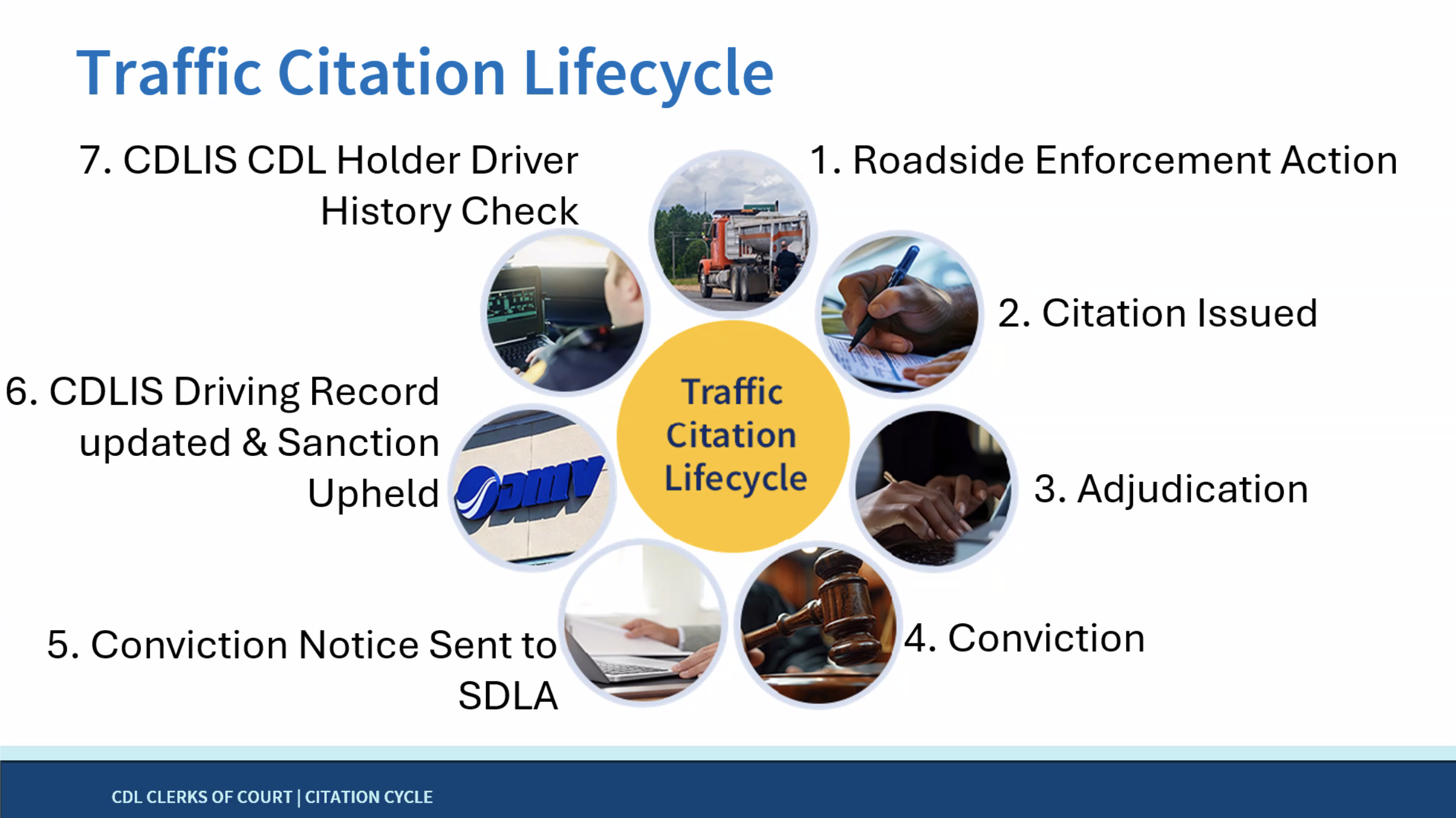The University of Cincinnati, in association with eScience & Technology Solutions, Inc. (eSTS), University of California, Los Angeles (UCLA), and North Dakota State University’s (NDSU) Upper Great Plains Transportation Institute (UGPTI) developed the reference documents presented on this website through an FMCSA-sponsored Commercial Driver’s License Program Implementation (CDLPI) Grant Agreement (Number 69A3602040473CDL0OH) for the “National Commercial Driver License Program Assessment” project. The goal of the project is to identify opportunities to strengthen the National CDL Program and enhance the ability of State Driver Licensing Agencies (SDLAs) to maintain compliance with Federal Motor Carrier Safety Regulations (FMCSRs) 49 CFR 383 and 384.
The Traffic Citation Lifecycle Process Flow diagram illustrates when each stakeholder group is involved. The lifecycle begins with a law enforcement officer issues the traffic citation and continues next through the adjudicatory process. The cycle is complete when the SDLA receives a conviction notice, updates the CDL holder's driving record, and imposes any sanction. The cycle begins again with a law enforcement officer verifying CDL status when conducting a roadside enforcement action.


The CDL Resource Guide is a comprehensive catalog of the resources available from CDL program stakeholders representing law enforcement, the judiciary and state driver licensing agencies (SDLAs).

These AAMVA resources are available to Jurisdiction and Association members only. Some references link to resource websites with multiple links to additional information. Each website contains at least one link to a resource for each section of 49 CFR 383 and 384.

The cross-referencing analysis links each section of 49 CFR Parts 383 and 384 with stakeholder resources. In several instances, multiple references are included for each section representing multiple stakeholders.
FMCSA – is the lead federal government agency responsible for regulating and providing safety oversight of commercial motor vehicles (CMVs), FMCSA's mission is to reduce crashes, injuries, and fatalities involving large trucks and buses.
FMCSA partners with industry, safety advocates, and state and local governments to keep our nation's roadways safe and improve CMV safety through regulation, education, enforcement, research, and technology.
AAMVA is a tax-exempt, nonprofit organization developing model programs in motor vehicle
administration, law enforcement, and highway safety. The association also serves as an information
clearinghouse in these areas and acts as the international spokesperson for these interests.
AAMVA
provides CDL technical assistance and training to SDLAs and maintains CDL systems that support the
National CDL Program.
NDAA is a national, non-partisan, non-profit, membership association. The NDAA provides
training, technical assistance, and services to prosecutors throughout the United States. NDAA
has also established the NTLC designed to ensure the quality of justice for traffic safety
adjudications.
NTLC (https://ndaa.org/programs/ntlc/) provides training and technical assistance to prosecutors,
law enforcement, judges and other traffic safety professionals. Working in collaboration with
FMCSA, NDAA has developed training and other resources on the enforcement, prosecution,
and record keeping of CDL violations, mastering masking, human trafficking, and other topics
related to the adjudication of CDL and CMV infractions and citations.
CVSA - is a nonprofit association comprised of local, state, provincial, territorial, and federal commercial motor vehicle safety officials and industry representatives. The Alliance aims to achieve uniformity, compatibility and reciprocity of commercial motor vehicle inspections and enforcement by certified inspectors dedicated to driver and vehicle safety.
The mission of the CVSA is to improve commercial motor vehicle safety and uniformity throughout Canada, Mexico, and the United States by providing guidance and education to enforcement, industry, and policy makers.
NCSC - is an independent, nonprofit court improvement organization founded at the urging of Chief Justice of the Supreme Court Warren E. Burger. He envisioned NCSC as a clearinghouse for research information and comparative data to support improvement in judicial administration in state courts.
Courts turn to the NCSC for authoritative knowledge and information, because its efforts are directed by collaborative work with the Conference of Chief Justices, the Conference of State Court Administrators, and other associations of judicial leaders.
All of NCSC's services — research, information services, education, consulting — are focused on helping courts plan, make decisions, and implement improvements that save time and money, while ensuring judicial administration that supports fair and impartial decision-making.
NJC - Created more than a half-century ago at the recommendation of a U.S. Supreme Court justice, The National Judicial College remains the only educational institution in the United States that teaches courtroom skills to judges of all types from all over the country, Indian Country and abroad. The categories of judges served by this nonprofit and nonpartisan institution, based in Reno, Nevada, since 1964, decide more than 95 percent of the cases in the United States.
The NJC Experience allows for interaction with colleagues that often results in lifelong friendships. The College is a safe and collaborative place where judges can discuss issues they are facing in their role. The College prides itself on the diverse group of judges that it has in its classrooms at any given time.